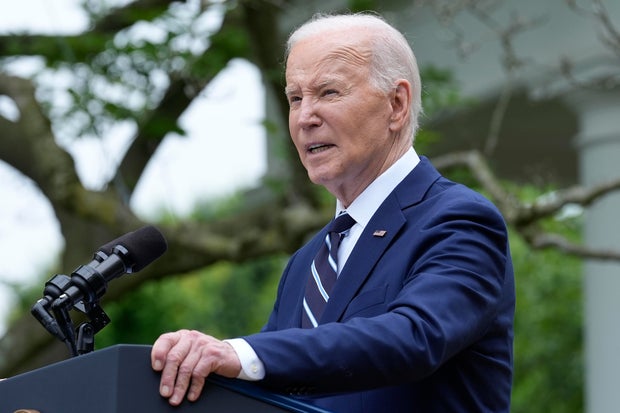President Biden announced new tariffs Tuesday on Chinese electric vehicles, semiconductors, batteries, solar cells, steel and aluminum. The tariffs on Chinese EVs will rise to 100%, quadrupling the current tariff of 25%.
It’s the latest bid by the Biden administration to keep China from undercutting U.S. companies and threatening U.S. manufacturing jobs, many of which are union jobs. At the White House Tuesday, the president recognized union workers in the crowd, along with members of Congress from key manufacturing and swing states. Mr. Biden said he’s “proud” to be labeled “the most pro-union president in American history.”
“I’m determined that the future of electric vehicles be made in America, by union workers, period,” he said.
The president is directing the tariff on solar cell imports from China to double to 50%. Tariff rates on certain steel and aluminum products will more than triple to 25%, up from 7.5% or less. The Biden administration is also doubling tariffs on Chinese semiconductors from 25% to 50% and increasing tariffs on Chinese medical supplies, batteries, critical minerals and ship-to-shore cranes.
“The fact is, American workers can out-work and out-compete anyone, as long as the competition is far. But for too long, it hasn’t been fair,” Mr. Biden said. “For too long, it hasn’t been fair.”
The president said it’s unfair for Chinese companies to create products cheaply because of subsidies from the Chinese government, and China’s practice of overproducing what the market demands renders competition unfair. Mr. Biden kept his remarks brief Tuesday, citing impending rain that threatened to drench the Rose Garden.
These steps together will raise tariffs on $18 billion in imports from China, the White House says, as the administration keeps in place Trump-era tariffs on China under Section 301.
Leading up to the announcement, Biden administration officials insisted that addressing climate change is still important to the administration, as they continue to seek to protect U.S. businesses.
“Cheap Chinese EVs that negatively impact U.S. businesses or workers do not further the cause of EVs in this country,” a senior administration official said on a call with reporters Monday.
Without going into detail about the policy change, national security adviser Jake Sullivan suggested the tariffs were intended to counter the threat posed by China’s business practices.
“It’s no secret that the president, this entire administration, has been concerned about unfair practices by the [Chinese] that harm American workers and businesses, the issue of overcapacity, the ways in which China has put in place a series of non-market, distorting practices in strategic sectors,” Sullivan told reporters at the White House Monday.
Lael Brainard, director of the National Economic Council, told reporters Monday that China is “using the same playbook it has before to power its own growth at the expense of others” by “flooding global markets” with excess exports.
In Beijing Tuesday, foreign ministry spokesman Wang Wenbin said China “always opposes unilateral tariff hikes in violation of WTO (World Trade Organization) rules and will take all necessary measures to safeguard its legitimate rights and interests,” Agence France-Presse reports.
As far as the EV tariff goes, the move is largely symbolic, for now. Chinese EVs are not a big part of the EV market in the U.S., but China’s exports overall have been rapidly increasing, up 50% over the past two years. China is producing EV cars that cost a fraction of those made by American automakers, and they’re receiving glowing reviews.
BYD, the world’s largest EV manufacturer rolled out a new car, the Seagull, which the Associated Press says “drives well and is put together with craftsmanship that rivals U.S.-made electric vehicles that cost three times as much.” It sells for around $12,000 in China, with a shorter-range version that’s under $10,000.
The new tariff dramatically hiking Chinese EV prices could ease some pressure on automakers, and on the United Auto Workers, which endorsed Mr. Biden’s reelection bid in January, considerably later than in 2020. One of the sticking points was the president’s efforts to transition the economy to EVs, which the union feared would hurt workers. In accepting the endorsement, Mr. Biden promised not to leave U.S. auto workers behind.
“China is determined to dominate that market, with EV predominantly made in China and Chinese jobs,” he said. “The previous administration was content to sit on the sidelines and let China take all these jobs, but I won’t let that happen.”
He added that “companies transitioning to new technology should retool, reboot, and rehire in the same factories in the same communities with comparable wages, and existing union workers should have the first shot at those jobs.”
Administration officials say the president’s announcement about the tariffs is not related to the upcoming election.
“This has nothing to do with politics,” a senior administration official told reporters, stressing that the president’s actions Tuesday reflect the conclusion of U.S. Trade Representative Katherine Tai’s quadrennial review — that China has continued to engage in unfair business practices.
Senior administration officials insisted the tariffs somehow will not result in higher prices for U.S. consumers. “No increases in costs,” one of the senior administration officials said.
In addition to the lower prices on tech consumer goods produced in China, U.S. officials have some fear that internet-connected Chinese consumer devices could be used to harm Americans through hacking or spying.
Democratic Sen. Sherrod Brown has proposed a ban on all imports of Chinese internet-connected vehicles. At this point, according to a senior administration official, the Biden administration doesn’t have a position on this issue, and the tariffs are geared toward protecting U.S. workers and American industry. The administration is still investigating whether internet-connected vehicles from China pose a national security threat to the U.S.
These ramped-up clean energy tariffs come after Mr. Biden asked U.S. Trade Representative Katherine Tai to consider tripling tariffs on Chinese steel and aluminum imports, an announcement Mr. Biden strategically made at U.S. Steelworkers headquarters last month in Pittsburgh.


